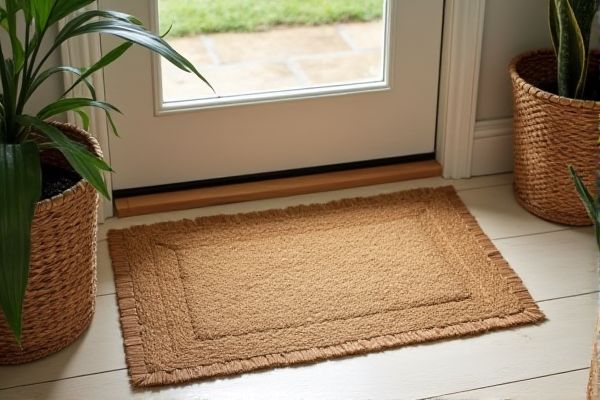
Mudroom bamboo mats offer durability and a sleek, modern look while effectively trapping dirt and moisture, but coir mats excel in natural fiber strength and superior dirt-scraping properties. To decide which mat best suits your home's needs, explore the detailed comparison in the rest of the article.
Table of Comparison
| Feature | Mudroom Bamboo Mat | Coir Mat |
|---|---|---|
| Material | Natural bamboo fibers | Fibers from coconut husk |
| Durability | High, resistant to moisture and wear | Moderate, can degrade with heavy moisture |
| Water Absorption | Low, dries quickly | High, absorbs moisture well |
| Cleaning | Easy to wipe or shake off dirt | Requires shaking or brushing, less easy to clean |
| Eco-friendliness | Renewable and biodegradable | Biodegradable and compostable |
| Appearance | Sleek, modern look with smooth texture | Rustic, coarse texture |
| Price Range | Medium to high | Low to medium |
| Ideal Use | Indoor mudrooms with moderate moisture | Entryways with heavy foot traffic and moisture |
Introduction: Choosing the Right Mudroom Mat
Mudroom bamboo mats offer durable, eco-friendly moisture absorption with a smooth texture that resists mold and mildew, making them ideal for contemporary homes. Coir mats, made from natural coconut fibers, provide excellent dirt-scraping ability and robust resilience against heavy foot traffic, protecting your floors from mud and debris. Selecting the right mat depends on whether you prioritize moisture control or dirt trapping to keep your mudroom clean and welcoming.
What is a Bamboo Mat?
A bamboo mat is a durable, eco-friendly floor covering made from natural bamboo strips, prized for its water resistance and easy maintenance in mudrooms. Unlike coir mats derived from coconut fibers, bamboo mats offer a smoother surface that effectively traps dirt while allowing quick drying. Their antimicrobial properties make bamboo mats a hygienic choice for high-traffic entry areas, enhancing cleanliness and longevity.
What is a Coir Mat?
A coir mat is made from natural coconut husk fibers, renowned for its durability and excellent dirt-scraping properties, making it ideal for mudrooms. Unlike bamboo mats, coir mats absorb moisture efficiently while providing a rough texture that helps remove mud and debris from your shoes. Choosing a coir mat enhances your mudroom's cleanliness by trapping dirt while offering a sustainable, eco-friendly option.
Durability: Bamboo vs. Coir Mats
Bamboo mats offer superior durability due to their dense fiber structure, resisting wear and moisture better than coir mats, which tend to fray and break down faster under heavy foot traffic. Coir mats, made from natural coconut fibers, excel at scraping dirt but may degrade quickly in damp conditions, reducing their lifespan. Your choice should consider the mudroom's exposure to moisture and usage frequency, as bamboo mats provide a longer-lasting, moisture-resistant option.
Moisture Resistance and Drying
Bamboo mats offer superior moisture resistance compared to coir mats due to their dense, water-repellent fibers that prevent water absorption and promote quick drying. Coir mats, made from natural coconut husks, absorb moisture more readily, which can lead to slower drying times and potential mold growth in damp environments. For high-traffic mudrooms exposed to frequent water and mud, bamboo mats provide a more durable and hygienic solution by minimizing moisture retention and facilitating faster evaporation.
Cleaning and Maintenance Comparison
Bamboo mudroom mats offer easy cleaning by requiring only regular sweeping and wiping with a damp cloth, making them resistant to mold and mildew. Coir mats, made from natural coconut fibers, need frequent shaking and vacuuming to remove embedded dirt but can retain moisture longer, making them prone to mold if not dried properly. Both materials benefit from periodic deep cleaning to extend lifespan, but bamboo mats generally provide lower maintenance due to their water-resistant properties.
Aesthetic Appeal and Design Options
Mudroom bamboo mats offer a sleek, modern aesthetic with smooth surfaces and natural wood grain patterns that complement minimalist and contemporary interior designs. Coir mats present a rustic, textured look with earthy tones and a rough weave, ideal for adding warmth and a natural vibe to entryways. Your choice between bamboo and coir mats can significantly influence the mudroom's visual style, balancing elegance and durability.
Eco-Friendliness: Sustainability of Bamboo and Coir
Mudroom bamboo mats and coir mats both offer eco-friendly choices for sustainable living, with bamboo mats derived from fast-growing, renewable bamboo plants that require minimal pesticides and water, promoting a low environmental footprint. Coir mats, made from natural coconut husk fibers, are biodegradable and utilize coconut industry byproducts, supporting waste reduction and resource efficiency. Choosing Your mudroom mat with bamboo or coir ensures a commitment to sustainability through renewable materials and environmentally responsible production.
Cost Comparison: Bamboo Mat vs. Coir Mat
Bamboo mats generally cost more than coir mats due to their durability and eco-friendly appeal, with prices ranging from $20 to $50 compared to coir mats, which typically cost between $10 and $30. Bamboo mats offer long-lasting resistance to moisture, justifying the higher initial investment, while coir mats are more affordable but may wear out faster in high-traffic mudroom areas. Choosing your mudroom mat depends on budget considerations and the desired balance between cost-efficiency and longevity.
Conclusion: Which Mudroom Mat is Best for You?
Bamboo mudroom mats offer durability, natural antimicrobial properties, and a sleek aesthetic, making them ideal for households seeking eco-friendly and low-maintenance options. Coir mats provide excellent dirt-trapping capabilities and water resistance, suitable for high-traffic areas requiring heavy-duty performance. Choosing the best mudroom mat depends on your specific needs for durability, moisture control, and environmental impact, with bamboo mats favoring sustainability and coir mats excelling in rugged functionality.
 homyna.com
homyna.com